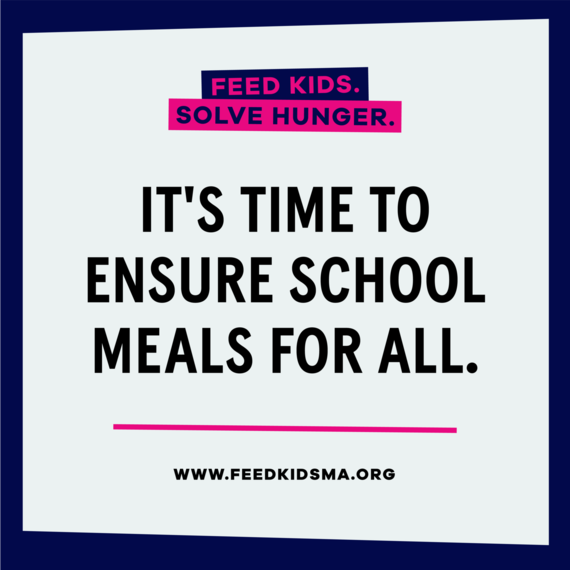Healey Administration Proposes $197 Million Investment to Fight Hunger
Project Bread
Governor Healey has released a supplemental budget proposal including significant investments to nutrition programs for MA families.
The proposal includes funds to ensure school meals are free for families through the end of the school year, provides a glidepath for families who will be impacted by the end of pandemic-related increased SNAP benefits, and also provides relief to SNAP recipients who lost benefits to recent skimming crimes.
Project Bread applauds the Healey-Driscoll Administration for continuing to demonstrate their commitment to systemically addressing food insecurity in their first major fiscal proposal by including these critical investments in sustainable food resources in the supplemental budget filed on January 30th. With over 21% of families with children currently facing food insecurity in Massachusetts, it is critical that we ensure that the programs that can meet the scale of this crisis are supported. In addition to supporting families across our state, the Administration is sending a powerful message that Massachusetts is a national leader in efforts to permanently solve hunger.
Today, over 400,000 kids have greater access to school meals and over 1 million individuals in Massachusetts have the purchasing power to buy food through the Supplemental Nutrition Assistance Program (SNAP).
FEEDING KIDS
School Meals for All
In a letter to the Administration and the state legislature, signed by a statewide coalition of anti-hunger advocates and organizations, Project Bread proposed 4 immediate priorities to solve hunger, the first of which is to extend and make School Meals for All permanent. The Healey-Driscoll Administration has taken a bold stance by including funding for universal school meals in the supplemental budget, and we are encouraged by the relief this will bring to many Massachusetts families in the coming months.
The Healey-Driscoll Administration has taken a bold stance by including funding for universal school meals in the supplemental budget
Why this investment is needed
Approved by the legislature through the annual budget process, School Meals for All was initially projected to increase participation in school meals by up to 50,000 students at a cost of $110 million.
Data from October 2022, finds over 80,000 additional students are participating in school meals in schools previously not serving free school meals to all compared to October 2019.
Eliminating the barriers of cost and stigma is working to ensure students have the nutrition they need. More kids are eating school meals as a result. This success is why the program needs additional funding in order to continue through the end of the 2022-23 school year.

SYSTEMIC SOLUTIONS
Investing in SNAP
Food insecurity is a crisis and systemic solutions are necessary to effectively combat it. The COVID-19 pandemic brought attention to an increasing need, and anti-hunger programs such as free school meals and supplemental SNAP benefits were swiftly implemented at the federal level. These programs, bolstered by greater flexibility and wider access, have allowed our most effective supports to reach more residents who are struggling to meet their most basic need of food.
At Project Bread, we know that these programs should have always been in place. While hunger is a byproduct of poverty -- not having enough money to pay your bills and pay for food – we also recognize hunger as a driver of poverty itself. When families are connected to the federal nutrition programs, the immediate need for food is met and research shows these programs help lift families out of poverty.
In 2021, SNAP and school meals lifted 3.4 million people out of poverty at the national level. (Boston Indicators, September, 2022.)

We applaud the Healey-Driscoll Administration's proposal to invest $197 million in helping families meet the immediate need for food through SNAP, while also leveraging state dollars to maximize federal nutrition programs and bring more money back into our state.
The Administrations investement in SNAP would create a smoother transition for households for the end of "COVID-SNAP" benefits, ending March 2023, and reimburse certain victims of SNAP benefit theft, known as "skimming".
“The Governor’s supplemental budget is evidence of the Healey Administration’s commitment to our most economically vulnerable friends and neighbors and to the Commonwealth continuing to lead the way nationally in the fight to solve hunger,” shares Erin McAleer, President and CEO of Project Bread. “ We thank our leadership in the state legislature for their ongoing support of these programs and ask that they respond with similar urgency to protect support for people across Massachusetts.”
MOVING FORWARD
You can help make School Meals for All Permanent
Project Bread will continue to fight to make free school meals a permanent policy in the Commonwealth. And we will continue to work with our state and federal legislative partners on boosting SNAP benefits, maximizing enrollment, increasing awareness, and permanently integrating food access into existing systems, like education and health care.
